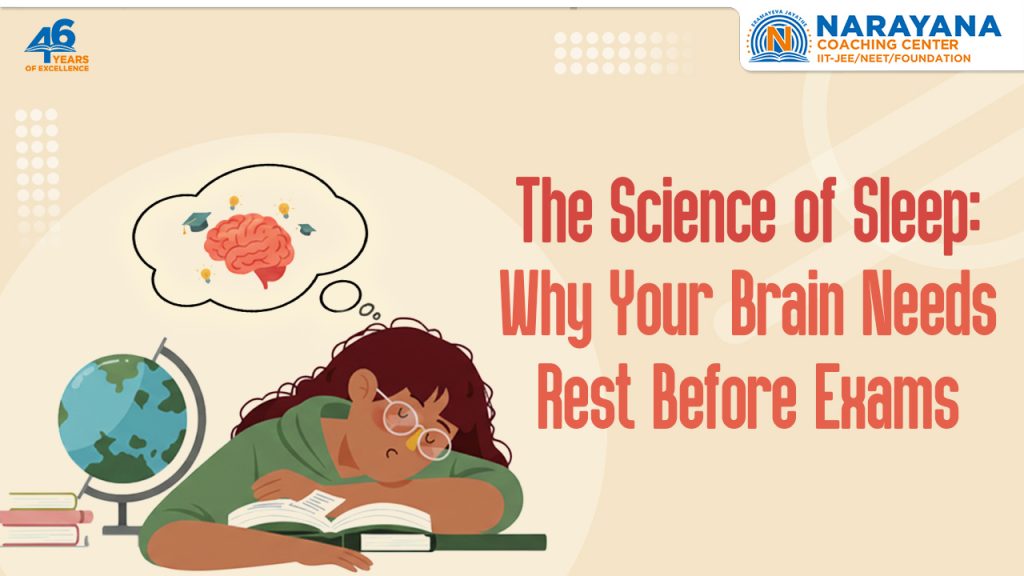
Why Sleep Matters More Than Coffee Before Exams
Picture this: it’s the night before your big exam. Your notes are spread out, highlighter in hand, and you’re faced with a choice—pull an all-nighter or get some sleep. Many students think studying all night will help them remember more, but science shows the opposite. Sleep isn’t wasted time; it’s one of the most powerful tools your brain has to prepare for success.
In this article, we’ll explore the fascinating science of sleep, why your brain needs it before exams, and how the right rest can boost memory, sharpen focus, and reduce stress.
The Science Behind Sleep and the Brain
1. Sleep and Memory: Your Brain’s Filing Cabinet
When you sleep, your brain doesn’t shut down—it gets to work. During deep sleep, it processes and organises everything you’ve learnt, much like a librarian filing books. Without enough rest, your brain struggles to store new information. That means late-night cramming can actually backfire.
2. REM Sleep: The Creativity Stage
REM (Rapid Eye Movement) sleep is when dreaming happens, but it’s also when your brain makes connections and improves problem-solving skills. This stage is especially important before exams because it helps you think more clearly and creatively.
3. Sleep and Focus: The Attention Recharge
Ever found yourself reading the same page over and over without absorbing anything? That’s the effect of sleep deprivation. Sleep restores your ability to focus, making it easier and faster to study the next day.
Why Students Lose Sleep Before Exams
Despite knowing the benefits, many students cut back on sleep before tests. Common reasons include:
- Cramming too late: Studying at the last minute.
- Anxiety and stress: Worrying about results keeps the brain racing.
- Distractions: Phones, social media, or late-night conversations.
- Poor time management: Struggling to balance homework, revision, and rest
Unfortunately, these habits only make exams harder than they need to be.
The Hidden Cost of Sleep Deprivation
Lack of sleep doesn’t just make you tired—it affects your entire body and mind.
- Weaker memory: Harder to recall what you’ve studied.
- Slower thinking: Problem-solving takes longer.
- Mood swings: Irritability, stress, or anxiety increase.
- Weaker immune system: Greater risk of getting sick.
One late night may not ruin your exam, but repeated sleep loss can seriously damage your learning ability.
How Much Sleep Do Students Really Need?
Experts recommend:
- Teenagers (13–18 years): 8–10 hours per night.
- Pre-teens (10–12 years): 9–12 hours per night.
So, if you’re in classes 8–12, aim for at least 8 hours of sleep—especially during exam week.
Smart Sleep Strategies for Exam Success
Here’s how to get quality rest before exams:
1. Stick to a Sleep Schedule
Go to bed and wake up at the same time every day—even on weekends. This trains your brain to know when it’s time to rest.
2. Review Early, Not Late
Study in the evening, but stop at least an hour before bedtime. This gives your brain time to relax and absorb what you’ve learnt.
3. Power Down Your Devices
Phones, laptops, and TVs emit blue light that tricks your brain into staying awake. Switch off screens 30–60 minutes before sleep.
4. Create a Bedtime Routine
Listen to calming music, read a light book, or practise deep breathing. These habits signal your body that it’s time to wind down.
5. Avoid Caffeine at Night
Coffee, tea, and energy drinks can keep you awake and reduce deep sleep quality. Instead, drink water or herbal tea.
Sleep vs. Cramming: Which Works Better?
Imagine two students:
- Student A: Stays up until 3 a.m. cramming.
- Student B: Stops studying at 10 p.m., gets 8 hours of sleep, and reviews in the morning.
Studies show that Student B performs better because their brain is rested, focused, and able to recall information more easily. Sleep turns short-term knowledge into long-term memory.
Practical Exam-Eve Routine (Sample Plan)
Here’s a sample plan for the night before an exam:
| Time | Activity |
| 6:00 PM | Light review of notes |
| 7:30 PM | Quick dinner (avoid heavy or junk food) |
| 8:00 PM | Practice problems or flashcards |
| 9:00 PM | Relax with music or journaling |
| 10:00 PM | Bedtime routine (no screens, calming activity) |
| 10:30 PM | Lights out for 8 hours of sleep |
Conclusion: Sleep Is Your Secret Exam Weapon
Exams test more than knowledge—they test how well your brain functions under pressure. And nothing boosts brainpower like quality sleep. By giving your body and mind proper rest, you improve memory, sharpen focus, and reduce stress.
So, the next time you’re tempted to pull an all-nighter, remember: sleep isn’t stealing study time—it’s fuelling your success.
FAQs About Sleep and Exams
- Is 4–5 hours of sleep enough before exams?
No. Coffee may keep you awake, but your brain won’t process or recall information properly. - Can I make up for lost sleep by sleeping extra later?
Partially—but the damage to memory and focus during the exam can’t be undone. - Is a short nap helpful before exams?
Yes, a 20–30 minute nap can boost alertness if you’re very tired. Just avoid long naps close to bedtime. - Should I wake up early to study or stay up late?
Waking up early after a full night’s sleep is far better than staying up late. - Does exercise improve sleep quality?
Yes! Regular exercise helps you fall asleep faster and enjoy deeper sleep. Just avoid intense workouts right before bed. - What if I feel too nervous to sleep?
Try deep breathing, meditation, or writing down your worries. These tricks calm your mind and prepare it for rest.
